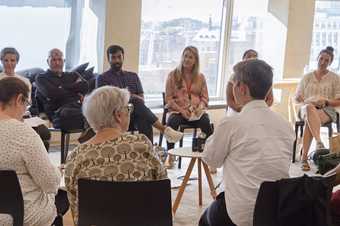How can cultural institutions re-imagine themselves to address new political and cultural realities? What kind of infrastructures do they need to do so? This day brings together museum, artist, and activist voices to explore how institutional infrastructures can be mobilised in different ways to evolve a collective understanding of how they work.
This event takes inspiration from Tania Bruguera’s Turbine Hall commission, where she uses activist strategies to explore how Tate Modern can be a platform for its local neighbours and migrant community audiences. As Tania’s commission draws to a close, the day attempts to reflect on methods used, and look forward to test new ways to intervene with the underlying structures of the museum.
Come along and discuss how cultural institutions, such as Tate, could utilise processes like HR, administration and communication to be creative tools for transforming the political and cultural role of the public museum.
This event is co-produced by Theatrum Mundi, Susannah Haslam, and Tate Public Programmes.
Programme
12.00 – 13.00
Infrequently Asked Questions quick-fire Q&A with Priya Khanchandani and Shaz Hussain (Museum Detox), Janine Francois and Tate staff. The session will be recorded, looped and played throughout the day in the space.
13.00 – 14.30
Informal Lunch with Tate Neighbours
Movement workshop with Zinzi Minott. (Places on the workshop are limited. Please book here.)
15.00 – 16.30
Group Discussion: Enacting New Models led by Natasha Cox and Eva Rowson
17.00 – 19.00
Presentation by Yuri Pattison of his work user, space
Panel discussion with Andrea Phillips and Natalie Bell, chaired by John Bingham-Hall and Susannah Haslam
Biographies
Dr. Andrea Phillips
Dr. Andrea Phillips is BALTIC Professor and Director of BxNU Research Institute, Northumbria University & BALTIC Centre for Contemporary Art. Andrea lectures and writes about the economic and social construction of public value within contemporary art, the manipulation of forms of participation and the potential of forms of political, architectural and social reorganization within artistic and curatorial culture.
Eva Rowson
Eva Rowson is an artist and curator. Her work is organised around questions of how we host each other, how we work together, how we build organisations – and the labour and structures that make all of this possible. This research is at the core long-term collaborative projects including ‘Wish you’d been here’, with artist Andrea Francke, examining the types of work and care that enable ’things to happen’, and ‘Como imaginar una musea?’, an evolving and collective Catalan-Spanish-English programme to reimagine the apparatus of the museum from a feminist perspective. She is currently Curator in Residence at Lighthouse, Brighton.
Natasha Cox
Natasha Cox lives and works in London. She is an artist working with words, performance, photography and space. Her most recent work Després (After) mapped a gathering of bodies on a temporary cave dance floor at the foot of the Monserrat mountains in El Bruc, Catalonia, Spain. She collaborates with others as Co— and is part of School of the Damned (class of 2018). She manages and programs at Assembly Point and is an associate member of Supernormal . She co-organises the Open Form platform, and is developing a database of free spaces in London as part of this ongoing project.
Janine Francois
Janine Francois is a Black Feminist Arts Educator whose practice is rooted issues social justice and intersectionality, education, participation and ‘art’. Janine is undertaking a practice-based PhD at Tate with the Schools and Teachers Team.
Natalie Bell
Natalie Bell is a passionate community activist and informal educator. She has over 20 years of diverse experience, beginning her career as a volunteer leading on local initiatives. Natalie was the founder director of SE1 United Youth Forum and the successful Threads Fashion programme and works at Coin Street Community Builders.
Shaz Hussain
Shaz Hussain is an Assistant Curator at the Science Museum and a member of Museum Detox, a professional network for people of colour working in museums. She is also the creator of the White Privilege Clinic, a creative intervention that challenges people to rethink systemic and institutional racism in the arts and heritage sector. Shaz is interested in how we can better represent people of colour in museums both in the collections and the workforce.
Zinzi Minott
Zinzi Minott’s work focuses on the relationship between dance, bodies and politics. Strongly identifying as a dancer, she seeks to complicate the boundaries of dance and the place of black female bodies within the form. Her work explores how dance is perceived through the prisms of race, queer culture, gender and class. Zinzi is interested in the space between dance and other art forms, and though her practice is driven through dance, the outcomes range from performance and live art to sound, film, dances and object-based work.

